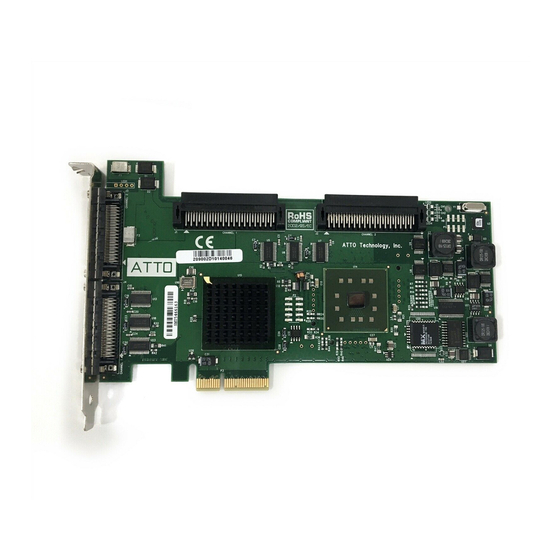ATTO Technology UL5D PCI Panduan Pemecahan Masalah - Halaman 7
Jelajahi secara online atau unduh pdf Panduan Pemecahan Masalah untuk Adaptor Host ATTO Technology UL5D PCI. ATTO Technology UL5D PCI 12 halaman. Atto technology ul5d lp host adapters: supplementary guide
Juga untuk ATTO Technology UL5D PCI: Spesifikasi Teknis (2 halaman), Bagan Kompatibilitas (1 halaman), Panduan Tambahan (8 halaman)

user is informed that the values shown are defaults. These defaults must be
committed in order to correct the state of the NVRAM.
o An error occurred updating the NVRAM - This message occurs during a
committal of NVRAM to the card. If the driver is unable to put the new
settings on the card, this message is displayed to the user and no changes
are made to the card.
o This is not a flash file, or it is corrupt – Checks are performed to assure the
proper file has been selected for flashing to the specific model of host
adapter.
B.) Linux Operating Systems
The host adapter driver was loaded properly and everything was working, but
the devices do not show up after the computer was rebooted. On some Red Hat
Linux distributions, the driver may not automatically load when the system is
booted.
To enable driver autoload in Red Hat 4 Add the following line to
/etc/modprobe.conf after installing the driver:
alias scsi_hostadapterX express2
To enable driver autoload in Red Hat 3 Add the following line to /etc/rc.modules
after installing the driver:
modprobe express2
(Note: you may need to create /etc/rc.modules and make it executable with
'chmod +x /etc/rc.modules')
The host adapter can detect the target device at LUN 0 but not the devices at
LUN 1 or higher in Red Hat Linux version 3 with kernel 2.4.
When using version 2.4 of the Linux kernel (eg. Red Hat 3), devices on LUN 1 or
higher may not be detected automatically when the driver is loaded. This is a
known issue with the 2.4 kernel. To manually detect such devices, issue the
following command:
$ echo "scsi add-single-device <h> <b> <t> <l>" > /proc/scsi/scsi
Where <h> is the host, <b> is the bus (always 0 for ATTO drivers), <t> is the
target, and <l> is the LUN. You can confirm that the device has been detected
by checking for it in /proc/scsi/scsi.
Page 7 of 12
Where X is the next available #.
Atto Technology, Inc.
January 19, 2007
